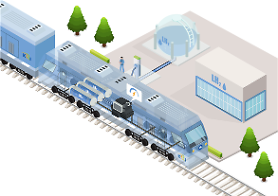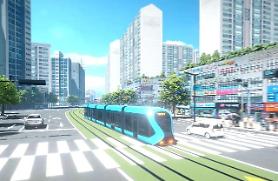
[Courtesy of Hyundai Rotem]
The Ulsan city government said it has secured final approval from the Ministry of Trade, Industry and Energy to go ahead with the demonstration of a hydrogen-electric tram equipped with a 400-kilowatt fuel cell module that can travel up to 200 kilometers (124 miles) with a single charge at a top speed of 70 km per hour.
Tram development and demonstration are handled by Hyundai Rotem, which showcased a concept tram in April. Some 42 billion won ($36.5 million) will be invested in the project that also involves the state-run Korea Railroad Research Institute (KRRI), the Korea Automotive Technology Institute (Katech) and Ulsan Technopark.
The Seoul government has called for the localization and verification of core technologies for hydrogen trams targeting overseas clients, saying that as an economical next-generation urban transportation system, hydrogen trams would contribute to South Korea's early transition to a hydrogen economy. The southern port city of Busan would establish a catenary-free light rail line covering 1.9 km. Construction will begin in 2021 for completion in 2023. The line would be extended by 3·3 km.
Because of their eco-friendly characteristics, fuel cells are considered the next-generation renewable power source. The Hyundai auto group is pushing for a hydrogen business value chain to popularize fuel cell cars, heavy-duty trucks, construction equipment, trains and ships. KPRI has embarked on the development of locomotives based on liquefied hydrogen that can operate at a maximum speed of 150 km per hour and cover at least 1,000km on a single charge.
The advantage of liquefied hydrogen is its high density compared to compressed gas, which means that more energy can be contained in a given volume for easy transportation. The institute hopes to put hydrogen locomotives into practical applications in 2025 after testing a hybrid system, storage technology and fast charging technology in the second half of 2022.
Copyright ⓒ Aju Press All rights reserved.



